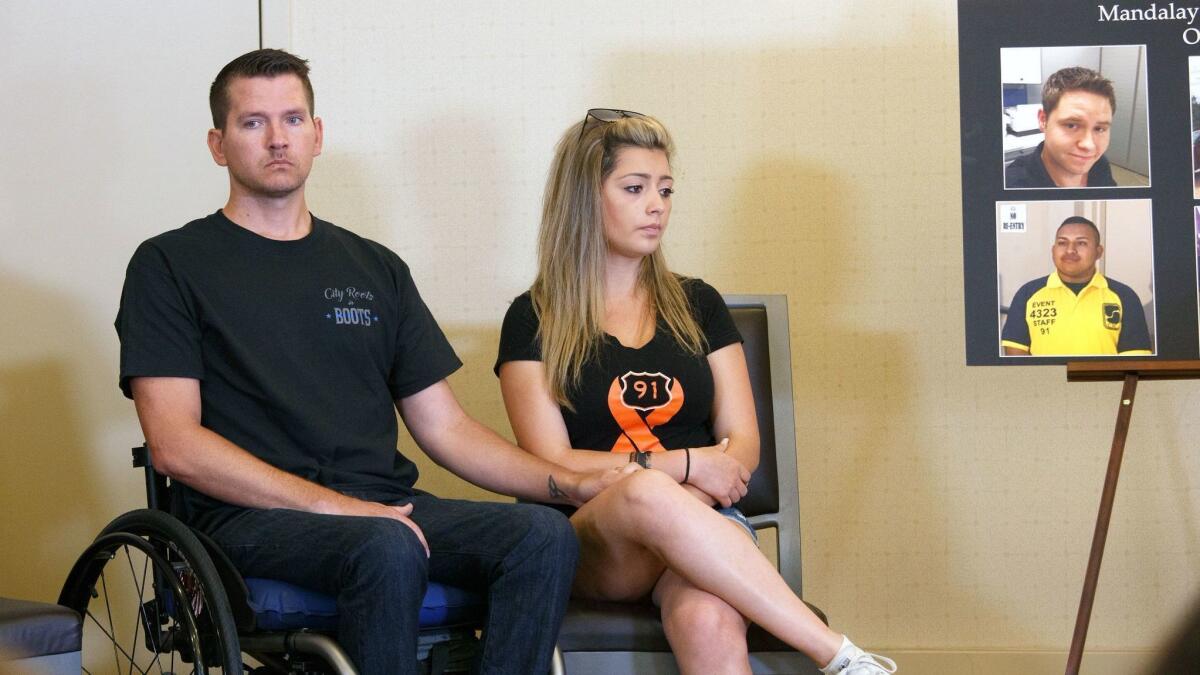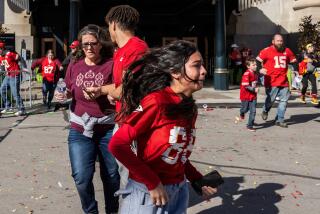Must Reads: An obscure federal law may give corporations immunity from lawsuits over terrorism

- Share via
For MGM Resorts International, millions of dollars could hinge on a single question: Was the shooting massacre of 58 people at a concert in Las Vegas last year an act of terrorism?
The killer, longtime gambler Steven Paddock, left few clues about his motive.
But how the U.S. Department of Homeland Security or the federal courts answer the question could determine whether shooting survivors and families of the dead can sue the casino and hotel giant, which they say missed warning signs of his attack.
In a novel legal move, MGM is arguing that the attack was terrorism, and that under a law passed by Congress in 2002, the company is immune from such lawsuits.
If MGM is successful, it could open the door for more companies and public agencies to seek protection from lawsuits not just over clear-cut terrorist attacks with political agendas, but over mass shootings with no known motive.
The Support Anti-terrorism by Fostering Effective Technologies Act — known as the SAFETY Act — is unfamiliar to most Americans.
It was an obscure bit of tort reform that passed after the 9/11 terrorist attacks, tucked into the same package of federal anti-terrorism legislation that created the Department of Homeland Security.
If the destruction of the World Trade Center towers in 2001 made Americans fear for their lives, corporations saw an additional threat from terrorism: legal liability.
Getting sued for safety lapses after a terrorist attack could be ruinous for any company.
But policymakers saw an additional problem. If companies are on the hook for negligence lawsuits after acts of terrorism, it might prompt those companies to decide it’s not worth it to provide security — say, X-ray machines or surveillance cameras — for places that might be targets of terrorism, like airports.
That’s where the SAFETY Act came in. The law allowed companies to apply to the Department of Homeland Security to seek verification that their security products and services were useful.
In exchange, Homeland Security would provide certification under the law, which would serve as a powerful immunity claim in court in case of a terrorist attack.
The law requires that liability claims be handled in federal court. Lower-level protections, called SAFETY Act “designations,” limit liability after an attack.
Higher-level protections, called “certifications,” generally allow companies and their clients to claim immunity as long as they did not misrepresent their services to the government during the SAFETY Act application process.
Over the last 16 years, more and more companies, along with airports, sports teams and stadiums, have submitted to the Department of Homeland Security review process and have received certifications.
The government’s SAFETY Act website shows some recent recipients:
- Rapiscan Systems Inc., for “devices that use X-ray radiation to scan vehicles, containers, rail, and cargo for threats.”
- Shooter Detection Systems LLC, for a “Guardian Indoor Active Shooter Detection System” designed “to provide building security personnel and other occupants with real-time active shooter information.”
- The NBA, for “a comprehensive set of mandatory security standards for team and arena management.”
Last October, the St. Louis Cardinals’ bid for SAFETY Act protections got a public boost from Sen. Claire McCaskill, a Democrat from Missouri, who noted how intensive the process can be.
“My committee staff has received briefings by the director of the SAFETY Act office and other DHS officials, the director of security for the Cardinals, and outside counsel advising the team on their applications,” McCaskill wrote in a letter urging the then-acting Homeland Security secretary, Elaine Duke, to give the Cardinals her “full consideration.”
The baseball team received its designation in December.
MGM itself does not hold a SAFETY Act certification. But the company it hired to provide security for the concert, the Route 91 Harvest Festival, does.
Contemporary Services Corp. received the government’s highest-level protections in April 2017 for “physical security, access control, and crowd management,” according to the SAFETY Act’s website. The company declined to comment on ongoing litigation.
MGM drew wrathful condemnations from the public after it asserted that the designation makes it immune from shooting survivors’ lawsuits.
It didn’t help in the court of public opinion that MGM asserted its immunity by preemptively suing shooting survivors, whose lawyers protested the maneuver as heartless.
But the company’s legal argument is not a totally off-the-wall interpretation of an obscure and untested federal statute. One of the attorneys retained by MGM, Raymond Biagini, who often defends government and commercial contractors, helped write the SAFETY Act.
The law describes terrorism as acts “intended to cause mass destruction, injury or other loss to citizens or institutions of the United States.”
That differs from traditional definitions of terrorism, which require an ideological agenda — opening the door for a possible interpretation that the law would cover mass shootings with no known motive.
The statute puts the determination of whether an attack was terrorism at the feet of Homeland Security Secretary Kirstjen Nielsen, who has yet to make a decision.
“The matter is currently under review within the Department of Homeland Security,” the agency said in a statement.
Matt Pearce is a national reporter for The Times. Follow him on Twitter at @mattdpearce.
More to Read
Sign up for Essential California
The most important California stories and recommendations in your inbox every morning.
You may occasionally receive promotional content from the Los Angeles Times.













